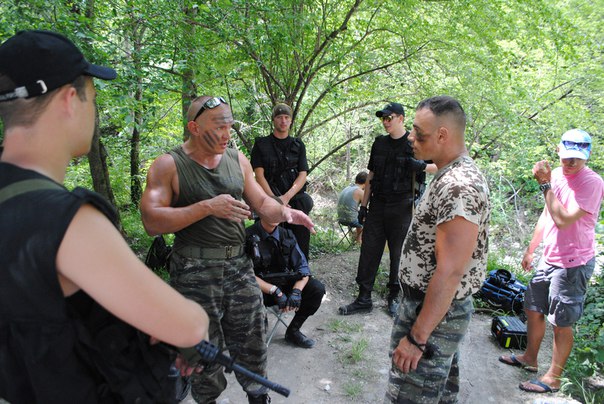
Сегодня специально для FIGHT-FILMS.INFO я побеседую с восходящей звездой русского боевика, актёром, сценаристом, писателем, инструктором по рукопашному бою и обладателем чёрного пояса по каратэ - Геннадием Казачковым.
Геннадий, добрый день!
Здравствуйте.
Первый вопрос - что привело Вас в мир единоборств - желание стать спортсменом, уподобиться герою боевика или же научиться стоять за себя? Какое из боевых единоборств Вы попробовали в первую очередь?
В моем детстве среди пацанов умение «махаться» было главным. Это определяло степень авторитета. Хотя я не жил в каком-то криминальном хулиганском районе, где приходилось постоянно драться. Детство проходило в стороне от подобных инцидентов. Конечно, киногерои, которые дрались в кино, были для нас кумирами. Выход на экраны таких фильмов, как «Неуловимые мстители», «Пираты ХХ века», «Не бойся, я с тобой», «Месть и закон» (Индия) и им подобных взрывали наш мальчишеский разум. Мы начинали махать руками и ногами уже на выходе из кинотеатров. Мотивом для занятий было и желание постоять за себя, и вообще хотелось быть «крутым». А какая может быть «крутизна» без умения красиво драться? Это после 20 лет понимаешь, что умение драться далеко не самое важное в жизни. А, если этого не понимаешь, надо лечить голову.
Я рос в маленьком городке в 80-х, когда не было никаких секций единоборств. Каратэ было под запретом. Мы где-то доставали перефотографированные книги по каратэ, пытались переводить расплывчатые тексты, переписывали рукописи. Лично я полностью переписал и перерисовал книгу по дзю-до! Потом нашли пару человек, которые изучали каратэ ранее, до запрета, тренировались у них. Это сейчас «черные пояса» на каждом шагу, в каждом зале. Для нас тогда «зеленый пояс» Женя Захаров был почти богом. Ближе к концу 80-х произошел прорыв. Каратэ легализовали, появились книги по разным единоборствам и видеофильмы с Чаком Норрисом и Брюсом Ли. До армии я занимался в секции каратэ стиля сито-рю. В армии уже экспериментировали с другими системами единоборств.
Какое из единоборств вы считаете наиболее подходящим для самообороны?
Я считаю, что, если нужно быстро поставить бойца с нуля, лучше всего подойдут кик-бокс, тайский бокс, сават и им подобные. Главное, чтобы вы постоянно работали «в контакт» и были минимальные ограничения. Например, до прихода в ОМОН, я занимался каратэ. По принятым тогда правилам в этом виде единоборств были запрещены удары руками в голову и работа в полный контакт. Удары только обозначались. Для меня стало большим сюрпризом встреча на ринге с боксерами уже на стадии поступления в ОМОН. Я не был готов защищаться от ударов руками в голову. Хорошо еще, что в армии мы работали в контакт. Пришлось переучиваться, становиться универсальным, добавить борьбу. ОМОН вообще многих отрезвил, опустил в реальность. К нам приходили мастера спорта по боксу, а их «выносили» парни, у которых не было даже юношеского разряда по бадминтону. Человек из искусственного мира правил ринга попадал практически на ринг боев без правил, где лежачего бьют, пока не прозвучит «стоп». Тогда бои без правил только начинали выходить из подполья.
Пригождалось ли Вам боевое искусство в реальной жизни, в условиях суровой улицы 90-х? Расскажите о самом запомнившемся случае, если это не секрет?
Не часто. Большую часть «лихих 90-х» я провел будучи бойцом ОМОНа. То есть в составе мощной организации, с которой все боялись связываться. Там, конечно, такие навыки были обязательными и постоянно применялись. Но и условия для подготовки были прекрасными. Потом, уже уйдя в частную охрану, пришлось применять один раз, помогая милиции – сами они не справлялись с хулиганами. Тогда нами была допущена ошибка. Один хулиган пострадал от меня довольно прилично. Он был очень сильный, поэтому отделаться «малой кровью» (во всех смыслах) не получилось. Потом милиционеры поддались на уговоры друзей хулигана и отпустили его. Утром он написал заявление на действия сотрудников милиции. Почему-то он (видимо, спьяну) считал виноватых в избиении милиционеров. К тому же в драке мне разбили часы, и я, в лучших традициях 90-х, потребовал компенсировать потерю в кратном размере. Так что на милиционеров «навесили» еще и вымогательство. Кстати, восстанавливая картину драки, мы выяснили, что часы мне разбил как раз милиционер дубинкой)) В общем, разобрались в итоге. В чем была ошибка милиционеров? Они пытались задерживать хулиганов, используя стандартные приемы самбо типа «захват, загиб, рычаг» и прочую ерунду. Я же по опыту работы в ОМОНе знал, что такими приемами человека можно «заломать» только, если он не сопротивляется. А агрессивного противника сначала нужно «вырубить».
Пару лет назад мне пришлось применять свои навыки против уличной «босоты», которая взяла моду громко материться в моем дворе. Их собралось человек 12, хотя активными были человек 8. Достали даже обрезок трубы в качестве оружия. Среди них была пара несовершеннолетних. И это осложняло ситуацию. Все знают, как начать драку или войну. Никто не знает, чем она закончится. Среди моих знакомых были примеры, когда не стоящий ломаного гроша конфликт заканчивался смертью или увечьями. Поэтому я такие острые ситуации стараюсь «разводить» на уровне разговора. Это лучший вариант. В той ситуации с «босяками» их лидер «отключил мозги и включил бычку». Видимо, хотел поддержать свой авторитет. Я не боялся, что они меня покалечат или убьют – не того калибра были мальчики. Хотя в моем детстве был случай, когда школьники-выпускники забили до смерти прапорщика. Я боялся, что кого-то покалечу, и они побегут писать на меня заявления с последующим вымогательством денег. К сожалению, джентльменские драки «одни на один» давно ушли в прошлое. Подлость, трусость, жадность стала в почете.
Вот так стоял перед ними и представлял заголовки в «желтой прессе»: «Актер, играющий на экране суперменов, решил показать себя, избив ребенка». Вы же знаете, как у нас могут высосать событие из пальца. В результате с помощью соседа пришлось немного погонять ребят, отобрав у них трубу. Теперь ходят, уважительно здороваются. Во дворе тишина и благодать. Огорчает только то, что из всего девятиэтажного дома не нашлось больше двух мужиков. Остальные ходят мимо, боятся сделать замечание. Мужиков все меньше становится.
Вы отдали многие годы своей жизни армейской службе. Потому такой вопрос: многие парни сейчас хотят идти в армию, но слишком опасаются тягот службы - что Вы, как опытный человек, посоветуете им в плане подготовки к службе и преодолении наиболее тяжёлых её этапов?
За 2 года службы в армии я ни разу не пожалел, что пошел служить. Сейчас, встречая разных людей, я вижу разницу между теми, кто служил, и теми, кто «откосил». Что-то эти хитрые ребята потеряли. Им не свойственны какие-то мужские понятия, принципы. Особенно это проявляется в деловых контактах. Боятся тягот службы? Да вся жизнь полна тягот. Куда от них спрячешься? Многое в армии на самом деле проще, чем в жизни. Но в армии ты не можешь играть, как в жизни, не можешь лицемерить - раскусят. Там все на виду. И там уже авторитет зарабатывается не кулаками, а тем, какой ты человек по жизни. Главное качество, которое нужно в армии – уметь жить в мужском коллективе. Умение дружить, умение ладить с теми, кто тебе не нравится, «разруливать» конфликты. Физические нагрузки пережить проще. Хотя, конечно, лучше быть к ним готовым. Главное, что нужно в армии в плане физподготовки – это бег, подтягивания, отжимания. Базовая ОФП.
Существует и другая ситуация - некоторые очень хотят служить, правда, не в какой-либо части, а сразу ехать в горячие точки (коих, к сожалению, хватает) "спасать угнетённые народы" или просто за длинным рублём, и речь идёт не только о "клавиатурных бойцах". Что Вы посоветуете таким людям?
Если человек хочет воевать – пусть воюет. Есть категория прирожденных воинов. Они для другого дела не годятся. Хотя у большинства из них судьба не складывается. По своему опыту скажу - воевать надо подготовленным. Причем, не в клубе страйкбола и, уж тем более, не в компьютерной «контре». Хотите узнать, что такое настоящая война, посмотрите фильм «Чистилище». Готовы вы пройти такое? Другой вопрос - что вы будете делать после войны? Проблема «вьетнамского синдрома» - неотъемлемое последствие войны для многих. Сможете вы потом в мирной жизни найти себе такие же сильные ощущения, как на войне? Или будете бухать, проживая прошлое в пьяных воспоминаниях? Есть войны, в которых надо участвовать – это защита отечества. Но искать себе на одно место приключения – это должно быть взвешенное, трезвое решение.
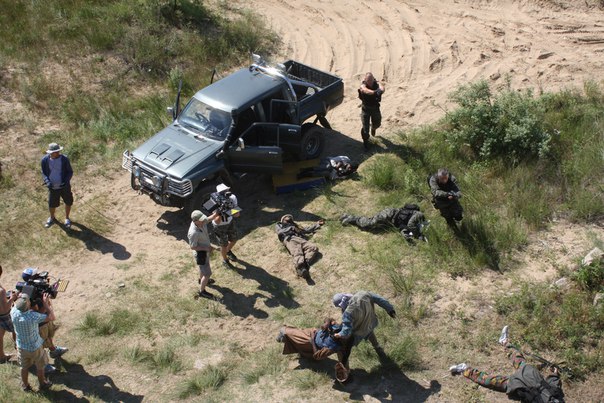
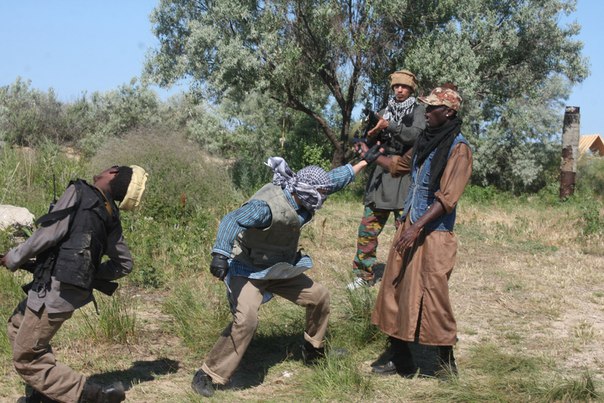
Переходим к Вашей кинокарьере. Мне известно, что в кино вы пришли достаточно поздно - после 30 лет. Каков был ваш первый опыт в этой индустрии?
Почти в 40. Первый опыт – съемка в фильме Михаила Пореченкова «День «Д».
Я впервые увидел Вас в сериалах «Позывной «Стая» и «Дружина», сделанных, судя по всему, одной и той же командой. Расскажите, как эта команда собиралась и как пришла идея создать "Дружину"?
Да, это делала одна кинокомпания. Команда была почти одна и та же. Это нормально, работать с теми людьми, которые хорошо сработали на первом проекте. Изначально была идея снять что-то в духе сериала «Спартак». Я горячо поддерживал эту идею и не оставляю мысль ее реализовать. К сожалению, все упирается в бюджет. Мы побоялись, что не потянем по финансам компьютерную графику, необходимую для такого проекта. В отечественном кинематографе такие технологии только начинают развиваться. До ТВ они пока не дошли. Поэтому мы решили сделать обычное историческое кино. У меня были разногласия с продюсерами на этот счет. Я предлагал делать фэнтези. Тогда мы бы избежали критики в исторических неточностях, которые неизбежны уже в силу противоречивости нашей истории. У нас были бы развязаны руки. Можно было бы шире использовать элементы сказки, мистики. Но, насколько я знаю, продюсеры канала «Россия-2» настояли именно на историческом кино.
После просмотра "Дружины" меня и многих, кому я рекомендовал этот сериал, мучает вопрос - когда же продолжение? Мне, например, не терпится увидеть новые бои с рыцарями, в частности с главой Ордена в его замке, да и других событий во времена Князя Александра Невского хватало. "Стая", впрочем, тоже закончилась сравнительным клиффхэнгером.
В судьбе «Стаи» и «Дружины» фатальную роль сыграло закрытие канала «Россия 2». Если бы этого не произошло, уверен, оба проекта имели бы продолжение. Причем, качественно стали бы еще лучше. Мы учитываем свои ошибки. Я даже написал 5 серий на третий сезон «Стаи». К сожалению, несмотря на невероятный успех сериала «Позывной «Стая», пока не нашелся канал, который захотел бы приобрести права на его продолжение. А ведь этот проект показали за 2,5 года около 70 раз по четырем отечественным каналам. Он был продан в десятки стран мира, включая, например, ведущий канал Китая CCTV. То есть это очень прибыльный сериал. Думаю, что ни один отечественный проект не имел такого успеха по этим показателям. Были мысли сделать полнометражную версию проекта с привлечением голливудских актеров. Даже сценарий есть. Но все упирается в деньги.
Немного критики: много боев "Стаи" и "Дружины" были сняты непопулярной "трясущейся камерой" - пусть бои и смотрелись отлично (особенно в сравнении с другими сериалами), но много моментов, буду честен, были и испорчены, в "Дружине" ситуация выглядела уже намного лучше. Почему сейчас принято снимать именно так, встряской?
Ну, это вопрос не ко мне, а к режиссерам, оператору, монтажерам. Но с чего Вы взяли, что «трясущаяся камера» непопулярна? Многим наоборот нравится. К тому же такая манера съемок задает определенный темп, динамику, позволяет скрыть какие-то огрехи в драке. Мы же не по-настоящему деремся. А хочется, чтобы выглядело по-настоящему, без дураков.
В «Дружине» драки смотрелись лучше, потому что в них постоянно участвовали каскадеры. В «Стае» такой роскоши у нас не было. Иногда приходилось бить людей из массовки, которые даже не имели опыта в единоборствах. Это специфика низкобюджетного кино. Поверьте, за те деньги, которые мы делали эти проекты, большинство кинопроизводителей снимают мелодрамы или дешевые «ментовско-бандитские» детективы, в которых весь экшн – это пару выстрелов и ударов кулаком. В «Стае» много компьютерной графики, которую зритель даже не замечает – она тоже стоит денег. Я не хвастаюсь, но то, что мы снимали такой насыщенный трюками сериал, как «Позывной «Стая», в обычном для «ментовских» сериалов темпе серия за 6 дней, это большая заслуга съемочной группы. Кинопроизводители меня поймут.
Планируются ли ещё боевики с Вашим участием?
Пока нет. Сейчас кризис и кинопроизводство в России в упадке.
В "Стае" и "Дружине" видно, что Вы находитесь в отличной физической форме. Расскажите о Вашем режиме питания и тренировках.
Режим питания и тренировок зависит от того, в какой фазе я нахожусь. Если у меня не предвидится съемок, в которых надо демонстрировать «сухую» форму, это в среднем 3-4 тренировки в неделю в «качалке». Может, пару раз в бассейне. Питание обычное для меня – никакого фастфуда, газированных напитков, прочего вредного «мусора». 5-6 приемов пищи в день небольшими порциями, включая спортивное питание. Алкоголь и сигареты для меня вообще неприемлемы.
Если готовлюсь к съемкам, то в зиму идет набора массы. Максимально я набирал 107 кг. За 3 месяца до съемок начинается плавная «сушка» до 93-95 кг. Урезаются углеводы (мучное, сладости), обычная пища часто заменяется спортивным питанием. Кстати, я готовился ко всем этим проектам не употребляя мяса. К тренировкам добавляется аэробная нагрузка. В моем варианте это могут быть единоборства, но лучшим способом считаю плавание. Я полтора года тренировался с боевыми пловцами, которые готовились к Олимпиаде в Сочи, и полюбил бассейн. На съемах первой «Стаи» количество тренировок доходило до 12 в неделю. Например, утром плавание, вечером «качалка». Хорошо, что у меня был единомышленник, мой друг актер Александр Эрлих. На съемках никто не создает актерам специальные условия для тренировок. Поэтому приходится изыскивать их самим. На съемках первой «Стаи» в Геленджике мы с «Шаманом» уже в 7.00 утра стояли под дверью «качалки», ожидая открытия, или плавали в море, потому что в 9.00 надо было быть на площадке. Сложно было тренироваться в Тунисе на второй «Стае» из-за жары и отсутствия тренажерного зала – ну, не спортивная это страна. Оставался бег и занятия со жгутами. Для меня были проблемы с питанием, особенно в плане замещения мяса. В итоге моя форма оказалась недостаточно хорошей и во втором сезоне «Стаи» Бес почти не раздевается. И вообще, очень сложно во всех отношениях держать «сухую» форму на протяжении 3-4 месяцев ради 2-3 сцен. «Качки» меня поймут. У меня такой организм, что «кубики» на животе стоят большого труда.Наше время подошло к концу, и по сложившейся в моих интервью традиции я прошу Вас, как сценариста и актёра, назвать 5-10 пунктов для создания хорошего, запоминающегося боевика.
- Хороший сценарий. Без него «кина не будет», даже, если собрать в кучу лучших актеров, режиссеров, операторов. Хороший сценарий – это 60% успеха по мнению М. Пореченкова. Хичкок говорит, что все 100%. Остальное от лукавого.
- Сценарий не может быть «про драки». Не бывает фильмов про войну, про инопланетян, про катастрофы. Фильмы бывают только про людей. Драки, экшн могут быть только способом выражения каких-то качеств героев, ситуаций на их пути. Никто не будет смотреть кино, в котором только стреляют и дерутся. Фильм «Рейд» хорош, и я очень уважаю его создателей, но второй раз смотреть его почему-то не хочется. В фильме «Параграф-78» великолепно поставлены драки, но смотреть фильм только ради них…
- Достаточный бюджет. Тут все понятно. Хорошую (особенно массовую) драку в кино надо минимум день ставить и день снимать. В отечественном сериальном производстве такой роскоши не предусмотрено.
- Режиссер, оператор и монтажер, которые снимают боевик, должны уметь это делать. Опыт съемок «розовых соплей», как я называю мелодраматическое «мыло», ничем не поможет в съемках хорошего экшна. Операторов, которые могут хорошо снять драку вообще единицы.
- Постановка экшн-сцен должна «разводиться» заранее, в привязке к объекту, на котором сцена снимается. Желательно с участием актеров, с репетициями. С оператором. Когда постановщик начинает «разводить» драку за час до начала ее съемки, получится «шляпа», которую можно увидеть в большинстве отечественных сериалов.
- Постановщики боевых сцен должны быть профессионалами, которые горят работой, а не приходят на площадку по-быстрому отработать свои деньги и свалить. Правда в том, что многие режиссеры, актеры и постановщики хотят побыстрее снять драку и двигаться дальше. Либо реально не имеют на это времени. А, насколько это хорошо снято для зрителя, мало кого заботит. «Пипл схавает». Лично меня такой подход раздражает. Благо на съемках «Стаи» и «Дружины» все было как надо. Мы «горели» этими проектами.
- Актеры для экшена должны подбираться подготовленные. Это значительно сократит время на съемку и будет качественно выглядеть на экране. Хотя современные технологии комбинированных съемок позволяют из любого «ботаника» сделать супермена на экране, искушенный зритель видит обман. А зритель не любит, когда его обманывает и переключает на другой канал. Постановщики трюков стонут от неподготовленности большинства актеров, а каскадеры потирают руки, зарабатывая на дублировании таких актеров) Благо и «Стая», и «Дружина» в этом отношении выиграли.
- Создатели фильма должны почувствовать ту грань, которая отделяет красивый кадр от реального. Реальная драка в жизни корявая, некрасивая. Но в кино востребовано другое, нечто в духе Ван-Дамма. И пусть это не реально, зато зрелищно. В кино это нормально. Главное, не перейти эту самую грань, после которого начинается пресловутое «индийское кино».
- «Враги» героев также должны иметь подготовку. А лучше быть каскадерами. Часто на них экономят, в результате зрелищность боев на экране теряется, а сам съемочный процесс затягивается.
- При возможности необходимо помещать сюжет в красивые натуры. Бой в джунглях, на краю обрыва, в лучах заката всегда будут смотреться интересней, чем просто на улице. Прекрасно, когда в бой включаются различные предметы обстановки, разное оружие, комбинация стрельбы и рукопашного боя, как в «Параграфе - 78».
- На всех этапах производства фильма нужно привлекать консультантов. Сейчас этого практически нет – продюсеры экономят. В результате все может быть снято правильно и профессионально, но на монтаже будет сидеть мальчик, который стрелял только из водяного пистолетика. И он не понимает, что пистолет становится на затворную задержку только после выстрела. В результате он подложит звук щелчка затвора вместо выстрела, и знающий зритель будет плеваться. Кино – продукт коллективный, как строительство дома. «Накосячить» можно на любом этапе.
- 12. Работать над фильмом нужно добросовестно, уважать зрителя, не держать его за дурака.
Огромное Вам спасибо за ответы на вопросы! Я желаю Вам здоровья и новых интересных проектов!
Желаю всем зрителям здоровья, удачи и настойчивости в достижении своей цели! До новых встреч на экране!



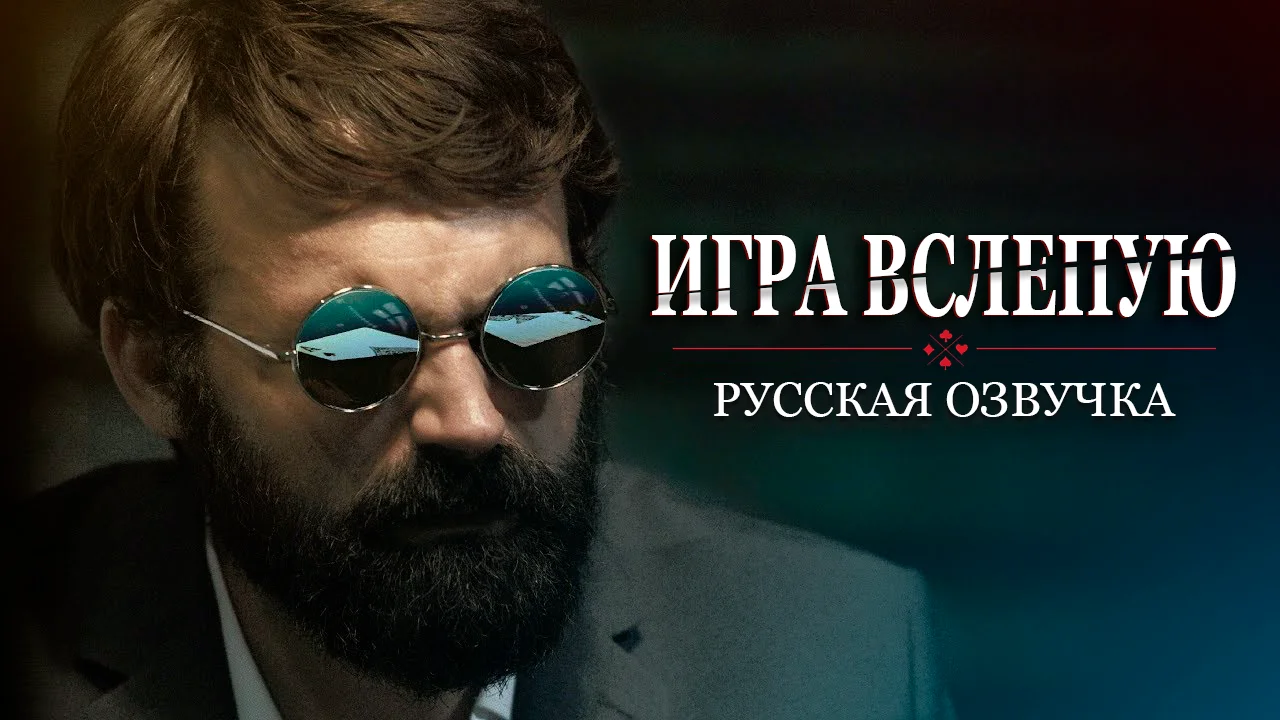
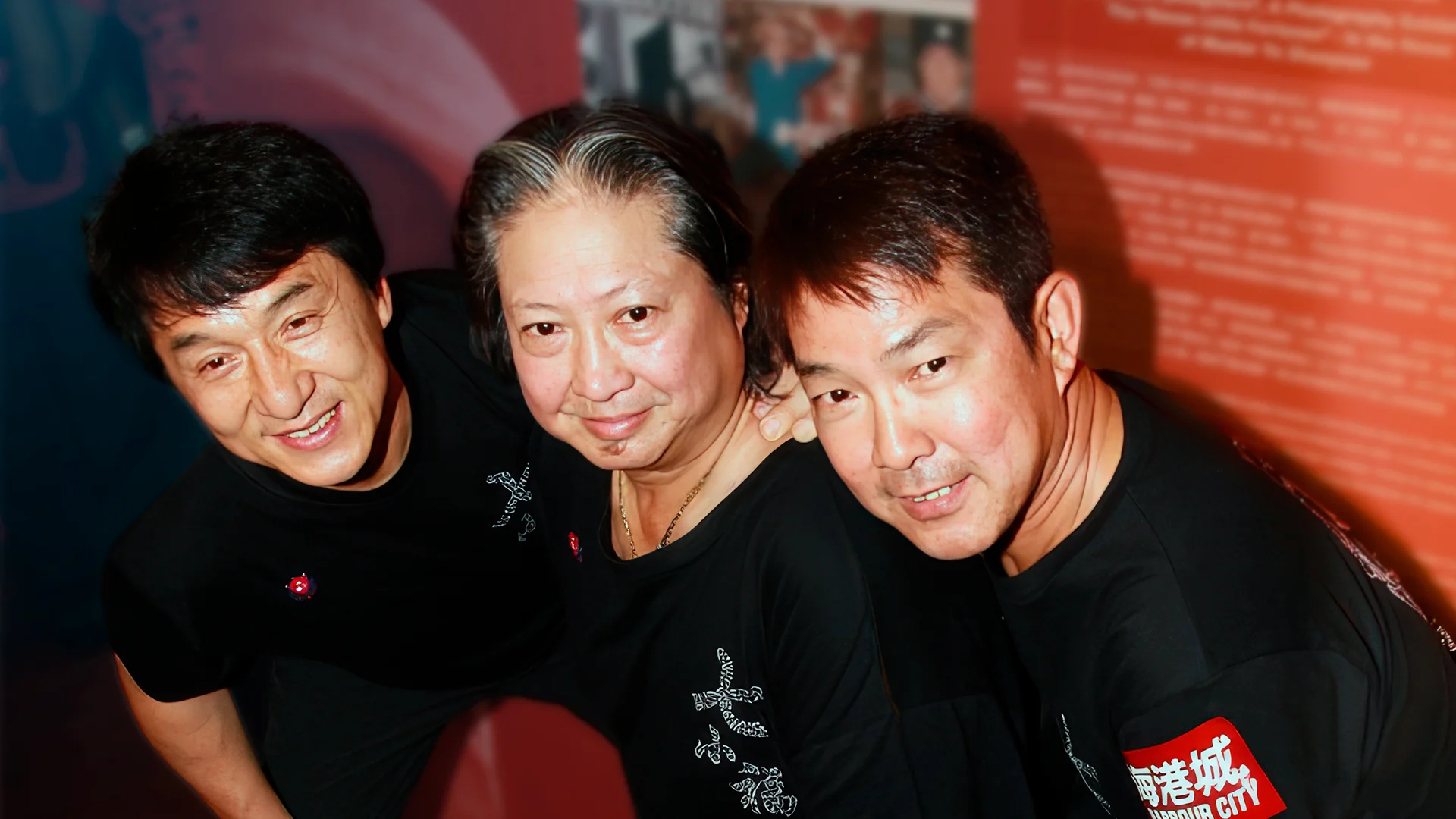
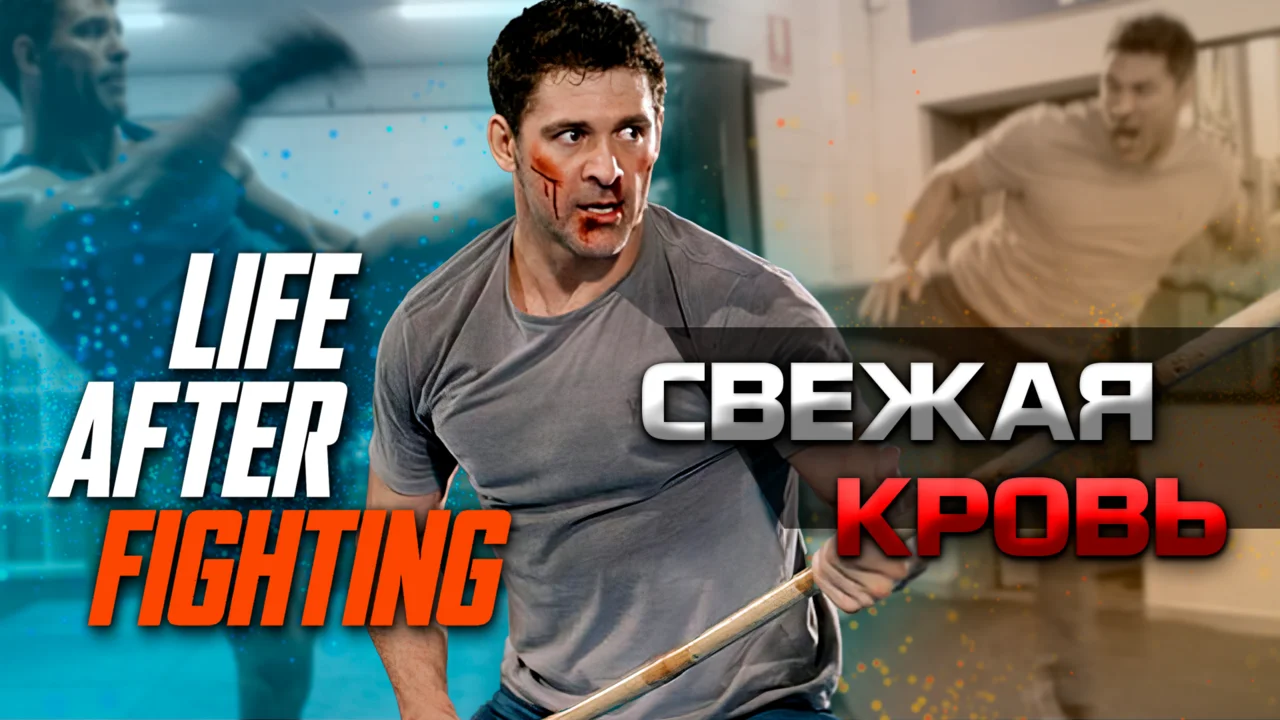
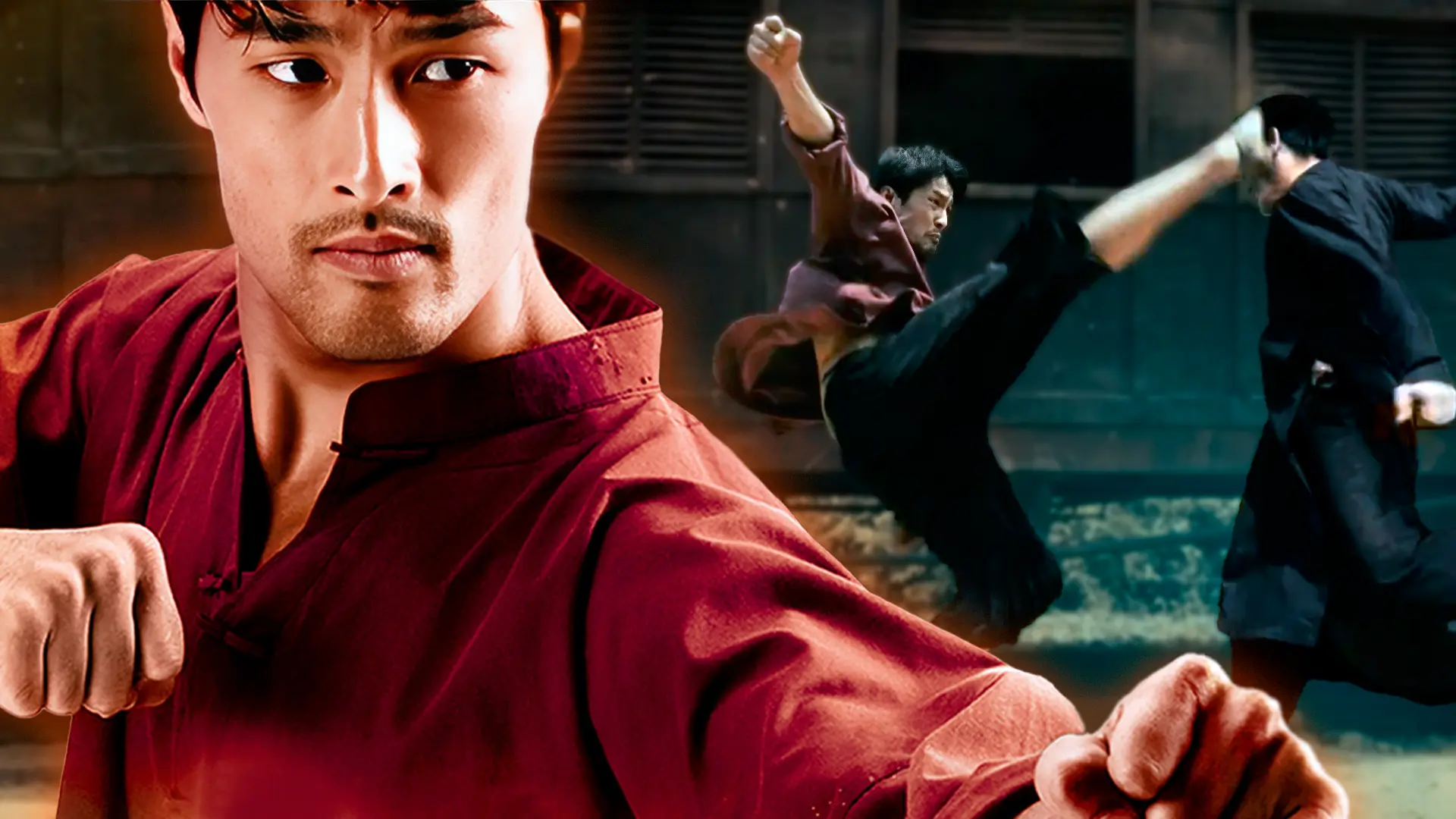
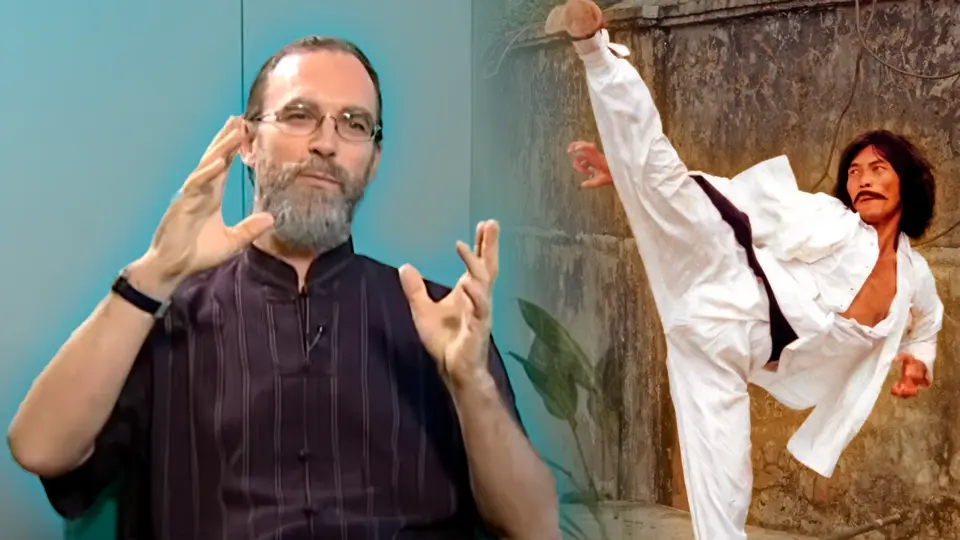
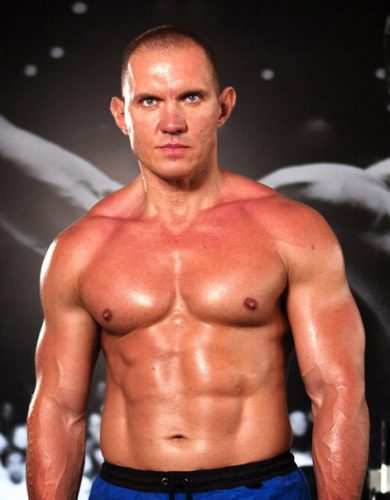
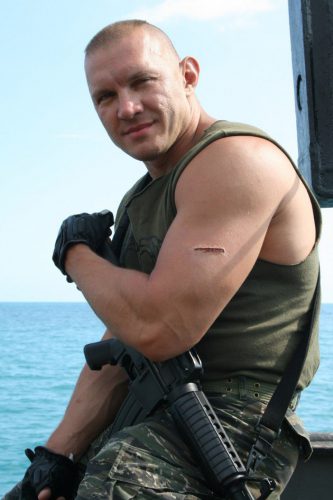
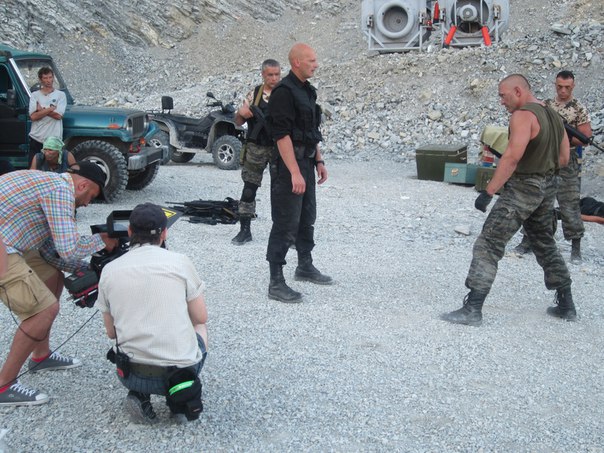
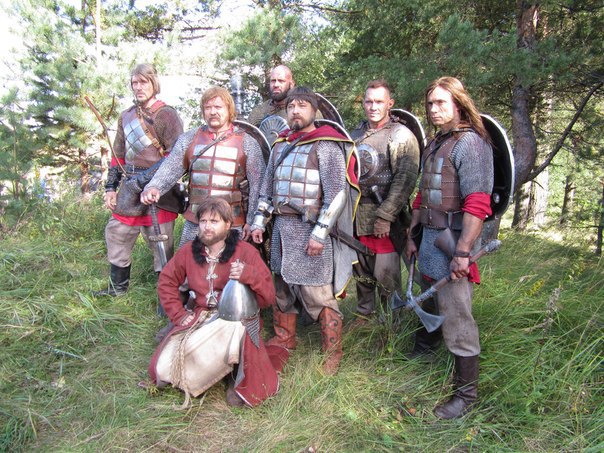
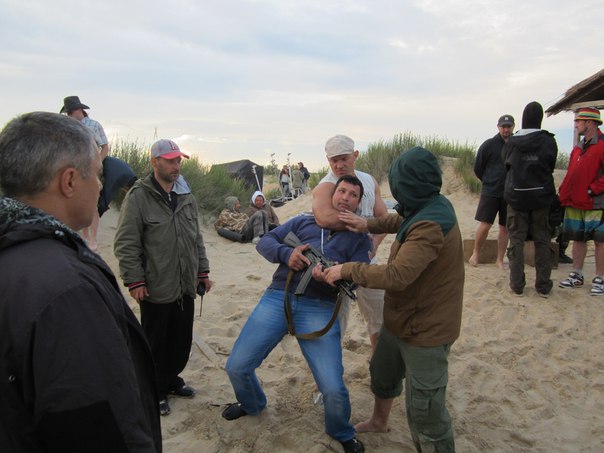
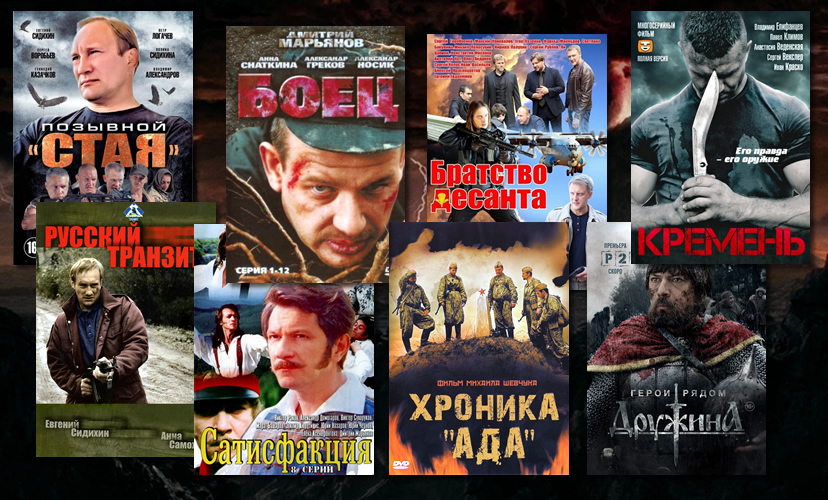
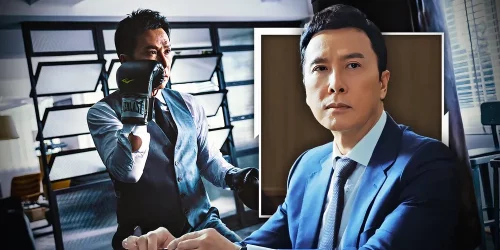
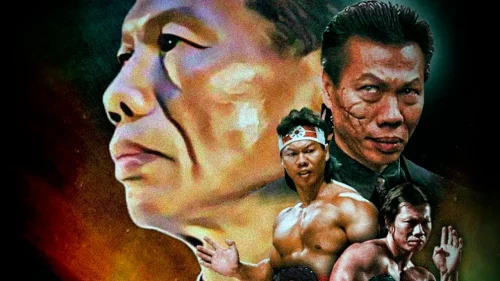
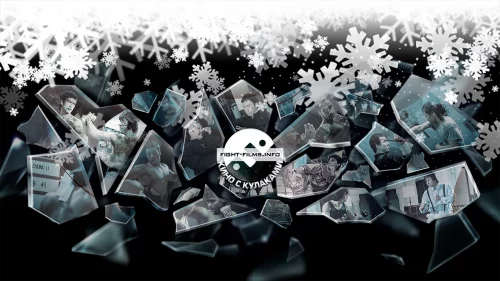
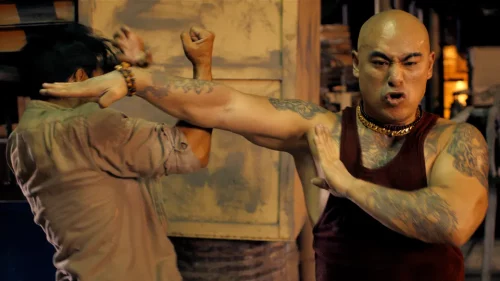
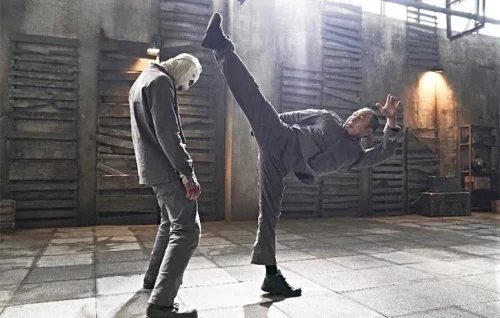
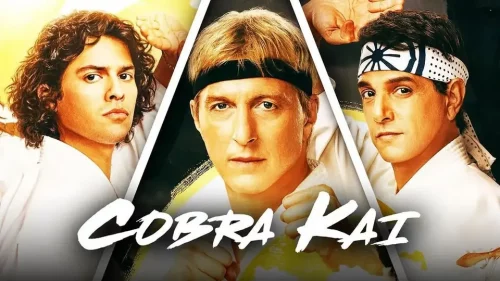
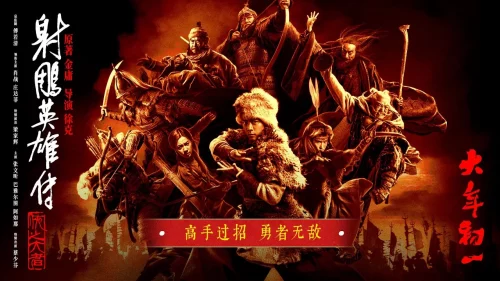
Спасибо вам ваши труды. Энтузиазм бесценен. Об экшне мало ресурсов. И ваша популяризация необходима…
С новым годом Вас всех, причастных к этому каналу, что я читаю уже больше…
Сложно сказать где бы Марко Сарор плохо смотрелся.)
В роли Крэйвена хорошо бы смотрелся Марко Сарор. Высокого роста, атлетичный, хорошо двигается. 100%…